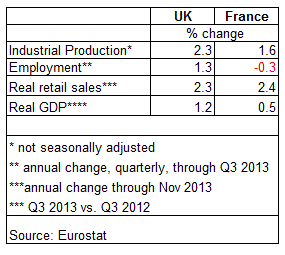Paul Krugman argues that it’s hard to tell the difference between the economies of the UK and France these days. He seems to be cherry-picking the numbers to make a point about the value (or the lack thereof) for austerity policies (the UK favors it, France less so). That’s an important discussion, but before you can have a productive debate it’s essential to look at the numbers clearly. Krugman cites GDP data across the past several years, but this isn’t very convincing for arguing that the nations are one and the same when it comes to macro trends of late. When you move closer to the recently published numbers, a different perspective emerges.
As a quick example, consider how the UK and France stack up on four key metrics via Eurostat numbers for industrial production, employment, retail spending, and real GDP. Ok, on the retail front, the two countries look similar: spending is a touch stronger in France vs. Britain. But in the other three indicators there’s no comparison: the UK’s doing clearly doing better, and by more than trivial degrees. This is particularly clear in employment: it’s higher by 1.3% through last year’s third quarter in Britain vs. a modest decline in France over the same period.

In fact, there’s quite a bit more economic news beyond these numbers that tell us that the UK macro trend looks quite a bit stronger relative to what we’re seeing in France. For instance, Markit’s purchasing managers indexes reflect growth in Britain vs. contraction in France. Sure, the future’s uncertain and so all this could change. But if we look at a broad set of indicators, and consider how they’ve unfolded over, say, the past six months, it’s hard to ignore the differences.
What’s more, it’s not difficult to find analysts who think that the UK edge will roll on. For example, the IMF this week published new economic forecasts and projected that UK GDP will grow 2.4% in 2014 vs. a sluggish 0.9% for France.
Let’s also not forget that the great debate about policy at the moment for Britain is whether the Bank of England should consider raising interest rates sooner rather than later because the jobless rate has fallen faster than the central bank expected. As Reuters reported earlier this week, “the unemployment rate dropped to 7.1 percent in the three months to November, a fraction above the 7 percent level which the bank has said is its threshold for thinking about raising interest rates from their current all-time low of 0.5 percent.” In France, by comparison, disinflation/deflation worries are lurking.
Politics, it seems, may be clouding Krugman’s analysis. Okay, we can debate why Britain is growing faster than France. And we should have that debate. But for the moment, it’s hard to make a case that the two economies are one in the same when it comes to assessing macro momentum.
